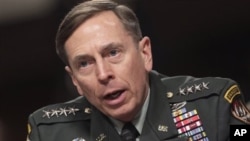The American commander of all coalition forces in Afghanistan, Army General David Petraeus, says security responsibility will begin to be transferred to Afghan forces in the coming months and that U.S. troops will begin to withdraw in July as planned. But he told the Senate Armed Services Committee on Tuesday that the process will be gradual to ensure that Afghan troops and government officials can sustain the areas where they take responsibility.
General Petraeus said the increased numbers of foreign and Afghan troops and civilian officials have made significant progress against Taliban influence during the past year. And he repeated his view that the insurgents’ momentum has been stopped in much of Afghanistan and reversed in several important areas, including Kandahar and Helmand Provinces.
The general said the effort to create local police forces in 70 key districts has been particularly important, along with a sharp increase in activity by U.S. special operations forces, working with Afghan troops.
He again endorsed President Barack Obama’s intention to begin drawing down the nearly 150,000 U.S. troops in Afghanistan by July. But Petraeus stressed that the withdrawal and transition to Afghan responsibility must be gradual.
"As we embark on the process of transition, we should keep in mind the imperative of ensuring that the transition we take will be irreversible. As the ambassadors of several ISAF [i.e., International Security Assistance Force] countries emphasized at one recent NATO meeting, we’ll get one shot at transition, and we need to get it right," he said.
Afghan President Hamid Karzai is expected to announce the first areas to come under Afghan control during the Afghan New Year celebration next Monday. Those areas have already been agreed to by a joint international and Afghan team and endorsed by NATO defense ministers.
But General Petraeus said foreign forces will not completely leave those areas. Rather, he spoke of “thinning out” the troop levels and sending some of them to other areas or to work as trainers for the Afghan army. Relatively few will return to their home countries because, Petraeus said, most will be needed during the coming warmer months to ensure his force can maintain recent gains and expanded them.
"Although the insurgents are already striving to regain lost momentum and lost safe havens as we enter the spring fighting season, we believe that we will be able to build on the momentum achieved in 2010, though that clearly will entail additional tough fighting," he said.
Petraeus used what has become the standard description of progress in Afghanistan, calling it “fragile and reversible.” NATO has set the end of 2014 as the target date for full Afghan security responsibility throughout the country. Even then, officials say, U.S. and other foreign troops will need to remain to support the Afghan effort.
But support for the war among Europeans has been low for a long time, and it appears to be waning among the American people as well. A new public opinion poll published by The Washington Post newspaper and ABC News indicates that about two thirds of Americans oppose the war, a record high level. And three quarters of Americans want a “substantial” withdrawal this year.
General Petraeus responded to the poll at Tuesday’s hearing.
"I can understand the frustration," he said. "We have been at this for 10 years. We have spent an enormous amount of money. We have sustained very tough losses and difficult life-changing wounds. But I think it is important to remember why we are there at such a time. That is where al-Qaida had its most important sanctuary in the world, and it had it under the Taliban."
Petraeus also said there is increased cooperation with Pakistani forces to squeeze insurgent groups between their safe havens in western Pakistan and U.S. and Afghan forces across the border. And he said Iran appears to be increasing its support for the Afghan insurgents, with the recent seizure of a large shipment of more capable rockets than the Taliban has usually had in the past. Petraeus said the shipment came from Iran’s elite Quds force.
The general also emphasized that the Afghanistan campaign is not only military. He said the coalition will not be able to kill or capture its way to victory, and that civilian efforts to improve governance, fight corruption and support Afghan reconciliation are crucial to success, and to the eventual withdrawal of most of the foreign troops from Afghanistan.


















